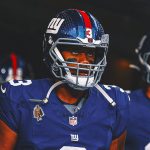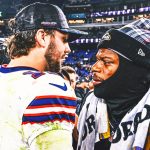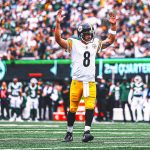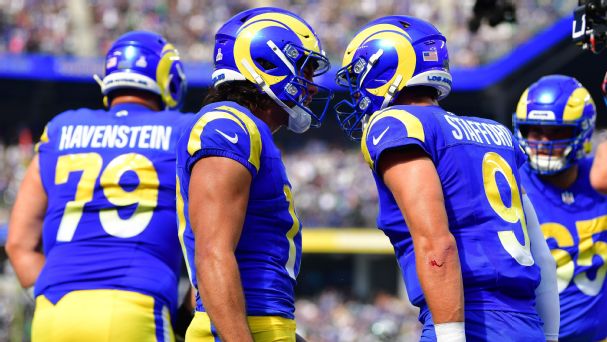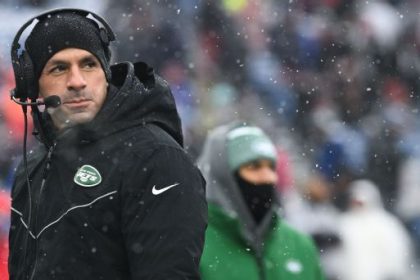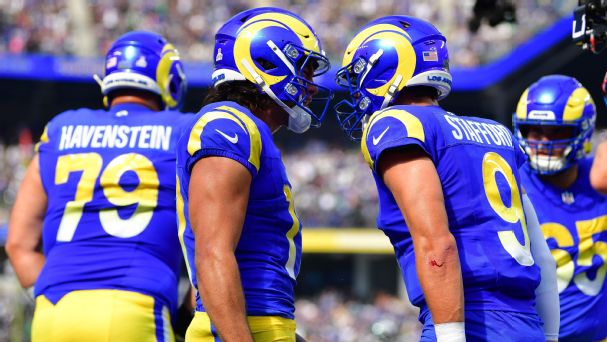
THERE WERE EIGHT seconds left in the game on Nov. 22, 2009, when Detroit Lions rookie quarterback Matthew Stafford took a vicious sack from Cleveland Browns linebacker C.J. Mosley.
Stafford laid on the field in pain before making his way to the sideline, where he was checked by the Lions’ medical staff. As the group discussed the quarterback’s injury, he heard the Browns call a timeout. The stoppage allowed Stafford to return for the final play, an untimed down after a penalty in the end zone. Stafford found receiver Brandon Pettigrew for his fifth touchdown — and the winner — to become the first rookie to throw five in a game since 1937.
With Stafford wearing a mic, NFL films immortalized the play, and it’s one that current Los Angeles Rams teammate Cooper Kupp harkens back to.
“It’s the embodiment of saying, ‘Hey, shoot, there’s a timeout. I have a chance to get back in the game,” Kupp said. “‘Coach, if you need me, I can throw. I’m here if you need me.’ And being able to come in and do what he did. That’s what I think of. And he’s embodied that from being a spry little rookie to what he is now.”
The Lions later found out Stafford separated his shoulder on the play. He played two more games that season before aggravating the injury. Because he wouldn’t be cleared for the season finale and needed minor knee surgery during the offseason, Stafford ended the year on injured reserve.
That toughness Kupp witnessed from afar, he’s now seen time and time again up close since Stafford came to Rams in a trade in 2021. It was molded for 12 seasons with Detroit and has continued in Los Angeles, where he led the Rams to a Super Bowl victory two seasons ago. On Sunday night (8 p.m. ET, NBC), Stafford will be back at Ford Field for the first time, looking to end his former team’s Super Bowl hopes.
The wild-card matchup with the Rams (10-7) will be the first playoff game the Lions (12-5) have hosted since the 1993 season. During Stafford’s time in Detroit, the Lions played in three road playoff games, all losses. Stafford has a career average of 277.7 pass yards per game at Ford Field, the fourth-highest by any quarterback at a single stadium in NFL history, according to Elias Sports Bureau.
“I had a lot of experiences there over 12 years,” Stafford said. “All my daughters were born there. My wife and I went through things there that the team and the city, the group, the town, everybody supported. So I have nothing but great memories there. Obviously didn’t get it done on the field as much as I wish we could have. But the people that I was lucky enough to know and grow with are people that I’m still close with today and mean a lot to me.”
STAFFORD’S FIRST GLIMPSE into what he believed an NFL quarterback should be came from watching Green Bay Packers Hall of Famer Brett Favre.
“He was the guy that showed up every Sunday no matter what was going on,” Stafford said. “Broken thumb, didn’t matter, he was going to find a way to be there for his guys.”
So despite the injuries in Detroit — and there were a lot — Stafford wanted to make sure he was available as much as he could be, “trying to show up every single week to be there for the guys, no matter what the record was, what the score was, how you were feeling.”
It’s something that resonated with Lions offensive tackle Taylor Decker, who played with Stafford for four seasons. One year, Stafford was dealing with back and hand injuries late in the season and the Lions were already eliminated from the playoffs.
Decker heard someone ask Stafford why he was playing through the injuries and Stafford reply, “Well, it’s Sunday and I’m the quarterback, so I’m going to go out there and play.”
“That’s just a badass thing to say,” Decker said. “… I think it kind of set the expectation for me that if you can be out there and help the team, then you should.”
That’s how Rams offensive tackle Joe Noteboom felt in Week 4, when he strained his groin against the Indianapolis Colts. Earlier in the game, he had seen Stafford walking gingerly after taking a hard hit, an injury that was eventually diagnosed as a hip contusion. Stafford was moving with a noticeable limp for the rest of the game, his muscles shutting down on him, he said. And so when Noteboom injured his groin, he knew he couldn’t leave the game, knowing what Stafford “was fighting through.”
“To see your quarterback just push through pain like he’s done in numerous games this year, in the past, it makes you want to fight for him even more no matter what you’ve got going on,” Noteboom said.
The Rams won that game in overtime when Stafford threw a touchdown to Puka Nacua, the first of the rookie’s career. It was one Nacua won’t forget, in part because he felt responsible for Stafford’s injury.
“It was my guy who ran free and hit Matthew in the hip causing him to have his hip injury,” Nacua said. “And I just remember thinking, ‘Wow, Puka. Everybody on the team is going to hate you. It was your fault that Matthew got hurt.’ And just thinking in my head, ‘Wow, that was the biggest screwup I could have out of all the things.’ … But him being able to get up, get back up and fight through that game and do what he did in that game and then the games [later in the season], he is the epitome of toughness.”
THE HIP INJURY wasn’t the only injury Stafford played through this season — and certainly not the most serious during his time in L.A.
Not long after winning Super Bowl LVI, Stafford had an injection to help with an elbow injury that Rams coach Sean McVay called “a little bit abnormal for a quarterback.” Stafford did not throw during the offseason program and was limited during training camp as the Rams attempted to get his elbow in a good place to start the 2022 season.
When his elbow was finally starting to feel the best it had all season, Stafford took a hard hit in New Orleans in Week 11 and was evaluated for a concussion. He was eventually diagnosed with a spinal cord contusion and missed the rest of the season.
This season, four weeks after the hip injury in Indianapolis, he injured the UCL in his right thumb in a loss to the Dallas Cowboys after hitting his hand on the field while attempting to catch a 2-point conversion. He missed six quarters (two in Dallas and then the Rams’ loss to Green Bay) and had the bye week to heal.
“I don’t think anybody really realizes the severity of the thumb issue and what he was playing through and what he still is continuing to be able to play through,” McVay said in late December. “There’s a reason why when you look at the respect that he’s garnered around the league and you got all these superlatives that you can really mention, but I think one of the coolest things that anybody can say about a football player is, hey, they’re mentally and physically tough, and that is exactly what this guy is.”
And after Stafford’s return — Week 11 against the Seattle Seahawks — he played his best football of the season, leading the Rams on a 6-1 run to clinch a playoff spot. During that span, the Rams offense scored at least 28 points in five straight games, and Stafford threw 14 touchdowns and one interception.
“A lot of times veterans as they get older, will take a day off throughout the weeks and stuff, especially when they’re dealing with stuff, but he’s finding a way to get out there and practice and push through it,” Rams backup quarterback Carson Wentz said. “And I know I respect the heck out of it. The guys, they see that stuff. They see your leaders of the team that are pushing themselves and pushing their bodies the way he does.”
Cleveland defensive coordinator Jim Schwartz saw Stafford’s success — something he was very familiar with as his head coach from 2009 to 2013 — up close again in early December, when the Rams hosted the Browns. Stafford threw three touchdowns in a 36-19 victory.
“You should get better with age,” Schwartz said of Stafford’s growth. “And usually what’s happening is, just like everybody, your mind and your experience are carrying, but sometimes your physical skills are declining. With Matt, his arm talent is still the same. Now that he’s healthy and throwing the way that he throws, it’s really impressive to watch.
“We were on the bad side of it a few weeks ago. He can just hand balls to receivers, no cushion at all, just hand balls to him and he gets rid of it quick, makes it hard to sack. All that experience, you’re not going to throw anything at him he hasn’t seen before. All that’s sort of helped him play the way he has this year.”
STAFFORD’S MENTALITY IS what stands out to defensive coordinator Raheem Morris.
“I can’t tell you how many times we’ve come off after a big play, a touchdown drive, a long drive and he just looks at me, ‘I got you,'” Morris said. “And that is reassuring as all get out. And it’s one of those things where you want to be able to repay him. It’s like we got to make this play for him.”
Morris points to the Rams’ divisional round matchup against the Tampa Bay Buccaneers during the 2021 playoffs. Buccaneers quarterback Tom Brady drove down the field twice in the fourth quarter to tie the score in a game that the Rams had led 27-3. But on the final drive, Stafford threw consecutive passes of 20 and then 44 yards to Kupp to set up the winning field goal.
“That’s the toughness of Matthew Stafford: not blinking, always being locked and loaded, ready to go,” Morris said.
And although rookie nose tackle Kobie Turner hasn’t been around Stafford for long, it’s something he has seen several times this season.
“There’s a lot of times mentally where something doesn’t go your way,” Turner said. “Even being a young player, there’s times early on in the year where one play doesn’t go your way and you start to spiral a little bit and it can get out of control and you have to really regroup. For him, it’s just something happens, ‘OK, the next play, this is the look that they gave me. This is where I messed up at. Let’s go get it back.'”
And it’s not just apparent within a game. After starting 3-6, Los Angeles won seven of its last eight games to end the season and nabbed the NFC’s No. 6 seed.
“He’s unfathomable,” Rams offensive coordinator Mike LaFleur said. “No matter what happens, he can always bounce back from it and he doesn’t always have to bounce back, but inevitably it’s the NFL and he’s playing the hardest position in all sports so there are going to be some not great things or things he wants back, and he just learns from it within the moment and just keeps on swinging.
“Every week I’m in awe a little bit more from him and I know his teammates are too … when he’s out there you always feel like you got a shot in the fight.”
ESPN’s Jake Trotter and Eric Woodyard contributed to this story.


